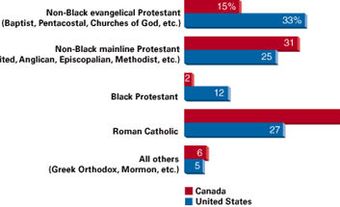Canadian Council of Churches
The Canadian Council of Churches, founded 1944, is the national ecumenical fellowship of Canadian churches: Anglican, Armenian Orthodox, Baptist,
The purpose of any ecumenical organization is to seek unity for a divided church and to remind Christians that they share Christ's mission for reconciliation, peace, dignity and justice for the whole community. Within individual member churches, local needs and specifically denominational concerns have, at times, taken precedence over ecumenical efforts, but all CCC members nevertheless maintain a theological commitment to ecumenism. The council works closely with nonmember Christian churches, as well as with communities of other faiths. It participates in Canadian interchurch coalitions for social justice, the Canadian Churches' Forum for Global Ministries and local councils of churches.
The Canadian Council, which provides an agency for consultation, planning and common action, was founded to co-ordinate the growing number of Canadian co-operative ventures in social service, religious education, evangelization and overseas mission, and to participate in the international ecumenical movement leading to the 1948 formation of the World Council of Churches, in which Canadians were prominently involved. The council communicates and co-operates with other national councils. It works closely with the WCC, though it neither contributes funds to nor receives financial support from the World Council. The CCC, with headquarters in Toronto, is governed and supported by its members through a semiannual Governing Board and Triennial Assembly. Two commissions co-ordinate its work: Justice and Peace and Faith and Witness.
See also Christianity; Ecumenical Social Action; Evangelical Fellowship of Canada.

 Share on Facebook
Share on Facebook Share on X
Share on X Share by Email
Share by Email Share on Google Classroom
Share on Google Classroom


